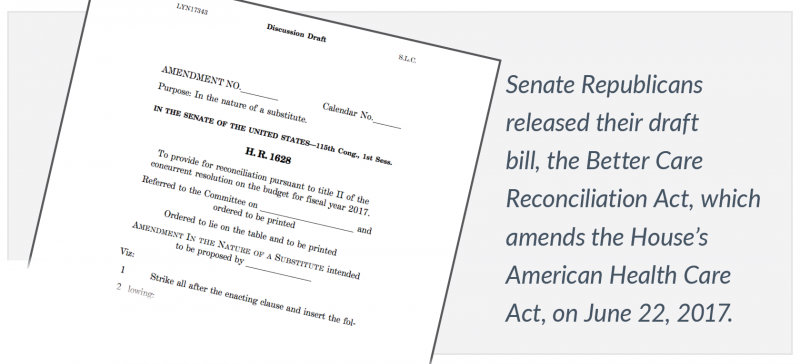TOPEKA–Kansas Health Institute has developed an issue brief describing the main elements of the U.S. Senate’s proposed legislation to repeal and replace the Affordable Care Act, a bill entitled the Better Care Reconciliation Act (BCRA). The Congressional Budget Office has estimated that compared to current law, the BCRA will result in 22 million more uninsured Americans and will also reduce the federal deficit by $321 billion by 2026. These impacts are primarily the result of ending enhanced federal funding for Medicaid expansion, reducing premium tax credits, eliminating cost-sharing subsidies, and enforcing slower growth in future Medicaid spending.
The brief highlights how the BCRA differs from current law and from the House-passed American Health Care Act (AHCA) and discusses elements of the BCRA that would affect Kansans, including:
- Repealing both the individual and employer mandates for insurance coverage;
- Requiring a six-month waiting period for individuals who experience a gap in coverage;
- Making premium subsidies unavailable to individuals who have access to any employer-sponsored insurance and less generous for some who remain eligible, and ending cost-sharing subsidies after two years;
- Allowing states to use Section 1332 waivers to waive essential health benefits requirements and other provisions that could affect individuals with pre-existing conditions;
- Phasing out enhanced federal funding for Medicaid expansion, but proposing to address the “coverage gap” by allowing more low-income people to use tax credits to pay for premiums; and
- Fundamentally changing how Medicaid is financed by creating hard caps on federal funding.
KHI also has prepared a memo in response to questions about how Medicaid per capita caps proposed in the AHCA and BCRA might affect Kansas.
The analysis shows that if the AHCA version of the caps had been in place in 2015 and 2016, Kansas would have needed to return $79 million in federal funds. The BCRA uses a different Medicaid growth rate than the AHCA to calculate spending targets starting in 2025, and the analysis shows that if that rate had been in place in 2015 and 2016, Kansas would have needed to return $211 million in federal funds.
The Kansas Health Institute delivers credible information and research enabling policy leaders to make informed health policy decisions that enhance their effectiveness as champions for a healthier Kansas. The Kansas Health Institute is a nonprofit, nonpartisan health policy and research organization based in Topeka, established in 1995 with a multiyear grant from the Kansas Health Foundation.

